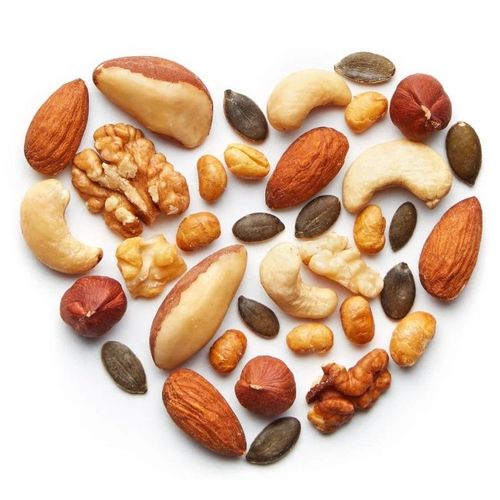If you've relegated nut to the "occasional snack" category, it's time to get more creative. Substitute nuts for some or all of the meat in a stir-fry entree .. . sprinkle sliced or chopped nuts over vegetables, rice, soup or cereal. .. add ground nuts to a smoothie or yogurt... dress salads with nut oils... spread nut butter on celery sticks or apple slices. From all comers of the nutrition world, wellness professionals are amazed by nuts' health benefits. Recent research shows that eating a moderate amount of nuts on a regular basis may help...
Control weight. According to Richard D. Mattes, PhD, MPH, RD, a professor of foods and nutrition at Purdue University who has done extensive research on the topic, nut consumption increases your resting energy expenditure, which means that you burn more calories just sitting still than you otherwise would. Also, about 5% to 15% of the calories in nuts are excreted without being absorbed. And nuts' unique combination of protein, fiber, fatty acids and other characteristics quells hunger quickly and for prolonged periods.
Prevent heart disease. Most of the fats in nuts are heart-healthy monounsaturated fats and omega-3 fatty acids that help lower LDL (bad) cholesterol and triglycerides .. .increase HDL (good) cholesterol. .. and prevent abnormal heart rhythms. Nuts also contain vitamin E, which inhibits arterial plaque buildup... and L-arginine, an amino acid that makes arteries more flexible and less vulnerable to clots.
Fight inflammation. The soluble fiber in nuts appears to increase production of the anti-inflammatory protein interleukin-4. Antioxidant vitamin E also eases inflammation.
Reduce diabetes risk. A Harvard study found that women who ate five or more ounces of nuts weekly were almost 30% less likely to get type 2 diabetes than women who rarely or never ate nuts.
Also: Spanish researchers found that nuts were even more effective than olive oil in combating metabolic syndrome, a condition that puts you at risk for diabetes and heart disease.
Combat cancer. Some nuts (including Brazil nuts and walnuts) are high in selenium, a mineral associated with a decreased risk for colorectal, skin and lung cancers. In animal studies, walnuts appeared to inhibit breast tumors-perhaps due to their disease-fighting omega-3s and antioxidants.
Support brain function. Evidence suggests that nuts' omega-3s may ease depression and boost thinking and memory by improving neurotransmitter function. Nuts also provide folate-and low levels of this B-vitamin are linked to depression and poor cognition.
Nut Types to Try
Per ounce, nuts typically have 160 to 200 calories and 13 to 22 grams of fat. Eating 1.5 ounces of nuts per day (a small handful) is enough to provide health-promoting benefits. Nuts naturally contain only a trace of sodium, so they won't wreak havoc with blood pressure, especially if you choose brands with no added salt.
''All types of nuts are good for you, so there's no such thing as a 'best' type of nut," Dr. Mattes emphasized. Still, each type does contain a different mix of nutrients-so for the widest range of benefits, eat a variety. Below are some excellent options and the nutrients that each is especially rich in. Consider...
• Almonds for bone-building calcium... and inflammation-fighting vitamin E.
• Brazil nuts for cancer-fighting selenium.
• Cashews for magnesium, which is linked to prevention of heart attacks and hypertension.
• Hazelnuts for potassium, which helps normalize blood pressure.
• Peanuts for folate, which lowers levels of the artery-damaging amino acid homocysteine.
• Pecans for beta-sitosterol, a plant compound that combats cholesterol.
• Pistachios for gamma-tocopherol, a form of vitamin E that may reduce lung cancer risk.
• Walnuts for the heart- and brain-enhancing omega-3 alpha-linolenic acid.
